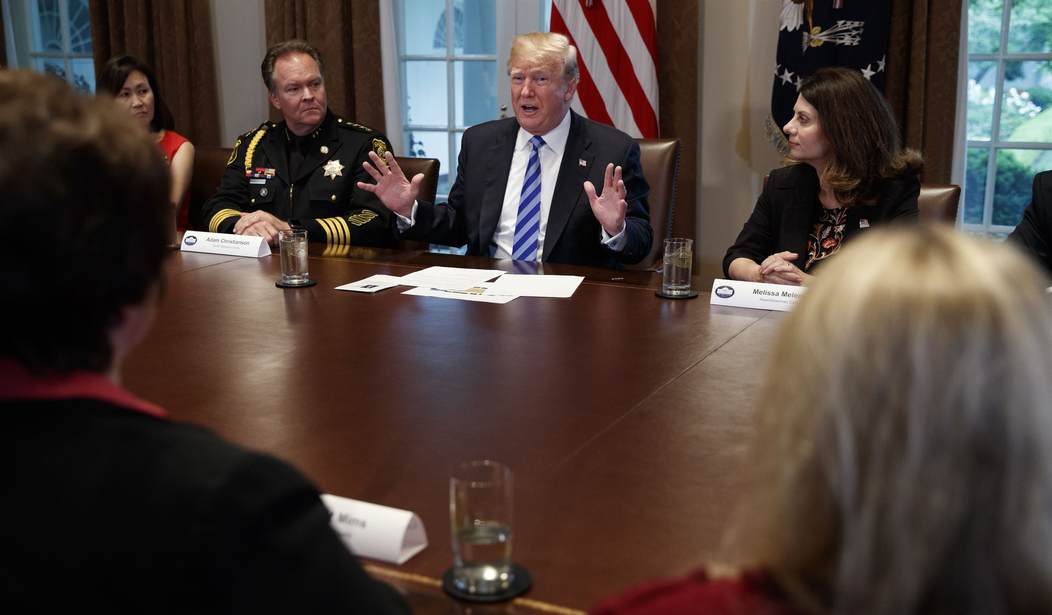We live in mean times. Spontaneous messages from "unthinking" parts of our brains are magnified on the megaphones of social media, given weight as if they actually meant something.
It is reported that a White House aide, while working at a private staff meeting inside the White House, where she reasonably assumed everything was off the record, expressed irritation with Sen. John McCain's opposition to the nomination of Gina Haspel for director of the CIA and dismissed it with the snarky remark "he's dying." (Aren't we all?) It was not meant to be heard outside the room, but she shouldn't have said it, and we shouldn't have heard it.
The cruelty was inflicted by whoever leaked it to the press, enabling the rest of us to feel morally superior, as if none of us has ever said an unkind word about someone. The one "shived," in the colorful description of White House counselor Kellyanne Conway, was made to look like the bad person.
It's not just the unthinking remarks that circulate through multiple news cycles, but thinking remarks can reopen old wounds, too. Such remarks make rounds in the media, social and otherwise, the "gotcha" in the capital's favorite game.
McCain is regarded by nearly everyone as an admirable man, even if many disagree with him (and it's OK to disagree with him). He was a courageous war hero despite President Donald Trump's mean remark disparaging his bravery. He's showing a noble bearing as he fights brain cancer. But he, too, was capable of making an unkind (and perhaps unthinking) remark about former Gov. Sarah Palin, his running mate in his losing 2008 Republican presidential campaign. He says now that he regrets choosing her instead of Sen. Joe Lieberman, a Democrat-turned-independent.
Recommended
Setting the record straight is understandable, but it was revisionist hindsight inflicted on a friend. Palin says McCain never wavered in his friendship toward her and repeatedly apologized for the bad treatment she received from his staff and handlers, but his revelation nevertheless hit her like "a gut punch." The political is personal.
Politics always brings out the best and the worst in the men and women who want to lead. They sometimes offer self-serving excuses disguised as the work of the Delphic oracle. Until recently, most of the rudest remarks were quickly buried. But no longer. The electronically charged media leaks that proliferate from all corners of the government at the speed of sound continually tempt the unwary to plucky, pungent sour grapes. Dining on spoiled food for thought is always a bad idea.
Social media and the internet make us eavesdroppers of the petty and the profane information, misinformation and disinformation with neither context nor depth. No one exploits this more skillfully than the president, who can't resist tweeting what frequently bypasses actual thought. Tweets initiated by emotion are treated as information. This is often counterproductive to achieving important policy goals.
There are few gatekeepers left to edit content in newspapers, and gatekeeping has never been particularly important in television news, leaving the field vulnerable to the men and women in the news trade who seek personal fame, fortune and self-aggrandizement. This inevitably leads to fragmentation and factionalism. Readers and viewers flee into enclaves, choosing a friendly bubble in which they can share filtered information. Common denominators of negativism become more binding than creative ideas.
This was evident in the health care debate. In the Democratic passage of Obamacare, then-House Speaker Nancy Pelosi correctly and cynically observed Congress had to pass the legislation to see what was in it, the better to keep impolitic details hidden. The Republican attempt to repeal and replace was quickly reduced to a catchy slogan, as conservatives demonstrated they could unite only over what they disliked.
The information revolution, which began with such promise, only adds to the chaos of finding what works and what doesn't. It's easy to expose what's wrong, to find errors big and small, and it's much harder to do the research and reporting necessary to produce a cohesive agenda.
When we lost the sources of authoritative news, writes Martin Gurri in his book "The Revolt of the Public and the Crisis of Authority in the New Millennium," everything became suspect. "Every presidential statement, every CIA assessment, every investigative report by a great newspaper, suddenly acquired an arbitrary aspect, and seemed grounded in moral predilection rather than intellectual rigor," he says.
The democratization of communications created a vast array of wildly disparate sources of information, and many communicators determined not so much to report the news as to package the news to influence public opinion. The megaphones that deliver such news rarely help the public discern what's important and what's not. We're left with a media chasing snark and trivia, much like a dog chasing a car when it isn't chasing its tail. Sad.

























Join the conversation as a VIP Member